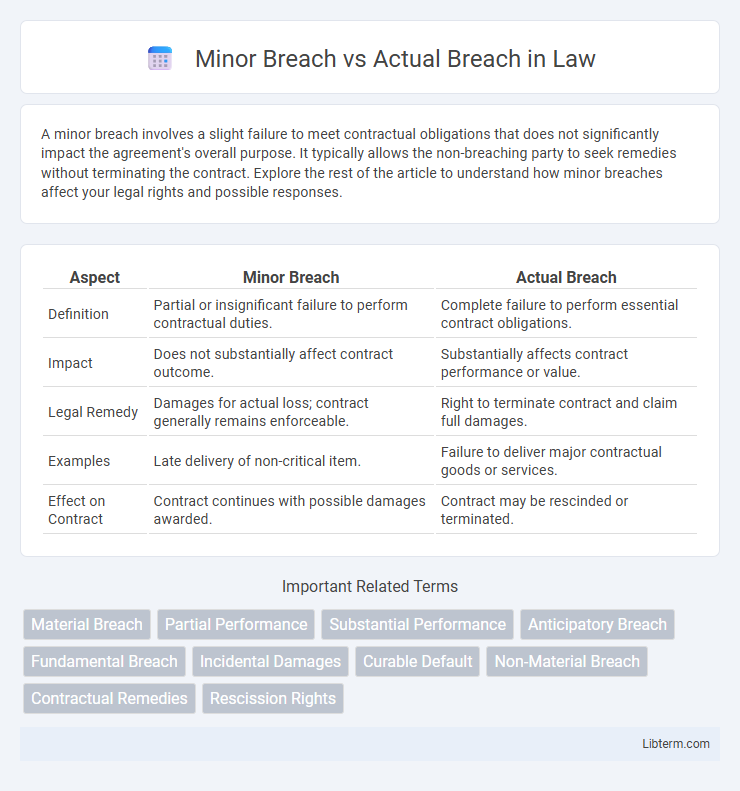A minor breach involves a slight failure to meet contractual obligations that does not significantly impact the agreement's overall purpose. It typically allows the non-breaching party to seek remedies without terminating the contract. Explore the rest of the article to understand how minor breaches affect your legal rights and possible responses.
Table of Comparison
| Aspect | Minor Breach | Actual Breach |
|---|---|---|
| Definition | Partial or insignificant failure to perform contractual duties. | Complete failure to perform essential contract obligations. |
| Impact | Does not substantially affect contract outcome. | Substantially affects contract performance or value. |
| Legal Remedy | Damages for actual loss; contract generally remains enforceable. | Right to terminate contract and claim full damages. |
| Examples | Late delivery of non-critical item. | Failure to deliver major contractual goods or services. |
| Effect on Contract | Contract continues with possible damages awarded. | Contract may be rescinded or terminated. |
Understanding Breaches: Definitions and Key Differences
A minor breach involves a partial or non-material failure to perform contractual obligations, often allowing the non-breaching party to seek damages without terminating the contract. Actual breach, also known as material breach, constitutes a significant violation that undermines the contract's purpose, granting the injured party the right to terminate and pursue full remedies. Understanding these distinctions is crucial for assessing legal rights, remedies, and enforcement strategies in contract law.
What Constitutes a Minor Breach?
A minor breach occurs when a contractual obligation is broken in a way that does not significantly affect the overall purpose or value of the agreement. It typically involves a partial or immaterial failure to perform, such as a delayed delivery or a minor defect in goods that can be easily remedied. This contrasts with an actual breach, which substantially undermines the contract and gives the non-breaching party the right to seek damages or terminate the contract.
Exploring the Scope of an Actual Breach
An actual breach involves a significant violation of contract terms that materially affects the agreement's performance or outcome, distinguishing it from a minor breach where the impact is negligible or easily remedied. The scope of an actual breach encompasses substantial failures such as non-delivery of goods, missed deadlines, or defective products that undermine the contract's core purpose. Legal remedies for actual breaches often include damages, contract termination, or specific performance, reflecting the breach's fundamental disruption.
Legal Implications: Minor vs. Actual Breach
A minor breach typically involves a partial or inconsequential failure to perform contractual obligations, often allowing the non-breaching party to seek damages without terminating the contract. An actual breach, also known as a material breach, significantly impairs the contract's purpose, granting the non-breaching party the right to terminate the agreement and pursue full remedies. Courts assess the severity, impact, and intent behind the breach to determine appropriate legal consequences and available remedies.
Contractual Remedies for Different Breach Types
Minor breaches, often termed partial or immaterial breaches, typically allow the non-breaching party to seek damages without terminating the contract, preserving the overall agreement. Actual breaches, or material breaches, significantly undermine the contract's purpose, enabling the aggrieved party to pursue remedies such as contract termination and full compensation for losses. Contractual remedies for minor breaches usually focus on specific performance or monetary damages that address the breach's impact, while actual breaches trigger broader remedies including rescission and consequential damages.
Impact on Parties: Consequences of Each Breach
A minor breach typically results in limited consequences, often requiring the breaching party to remedy the issue without significant penalties, preserving the overall contractual relationship. An actual breach, however, triggers substantial legal remedies, including damages, contract termination, and potential litigation, significantly impacting both parties' obligations and rights. The severity of an actual breach often disrupts business operations and financial stability more profoundly than a minor breach.
Examples Illustrating Minor and Actual Breaches
A minor breach occurs when a party fails to perform a non-essential part of the contract, such as delivering goods slightly late without affecting the overall purpose, like receiving a shipment of furniture a day late but still usable. An actual breach, or material breach, involves a significant failure that undermines the contract's core objectives, exemplified by delivering completely wrong goods or failing to perform a critical service, such as a contractor abandoning a construction project halfway. Courts typically assess the breach's severity by examining how much it impairs the non-breaching party's benefits and whether the contract's main purpose remains intact.
How to Address a Minor Breach
Addressing a minor breach involves promptly identifying the issue and communicating transparently with all affected parties to mitigate potential damages. Implementing corrective actions such as revising processes, enhancing training, or tightening controls prevents escalation into an actual breach, which entails significant contractual or legal consequences. Documenting all steps taken ensures compliance and supports dispute resolution if needed.
Responding to an Actual Breach Effectively
Responding to an actual breach effectively requires immediate action to contain the damage, including isolating affected systems and conducting a thorough investigation to identify the scope and source of the breach. Implementing a clear incident response plan with defined roles, regular communication with stakeholders, and timely notification to regulatory bodies ensures compliance and minimizes legal repercussions. Employing advanced cybersecurity tools, continuous monitoring, and post-incident analysis helps prevent recurrence and strengthens overall security posture.
Preventing Contract Breaches: Best Practices
Preventing contract breaches requires clear communication and precise contract terms to distinguish minor breaches from actual breaches effectively. Implementing regular contract reviews and monitoring performance metrics helps identify potential issues early, reducing the risk of significant violations. Incorporating dispute resolution clauses and fostering collaborative problem-solving ensures minor breaches do not escalate into material breaches, safeguarding contractual relationships.
Minor Breach Infographic

 libterm.com
libterm.com